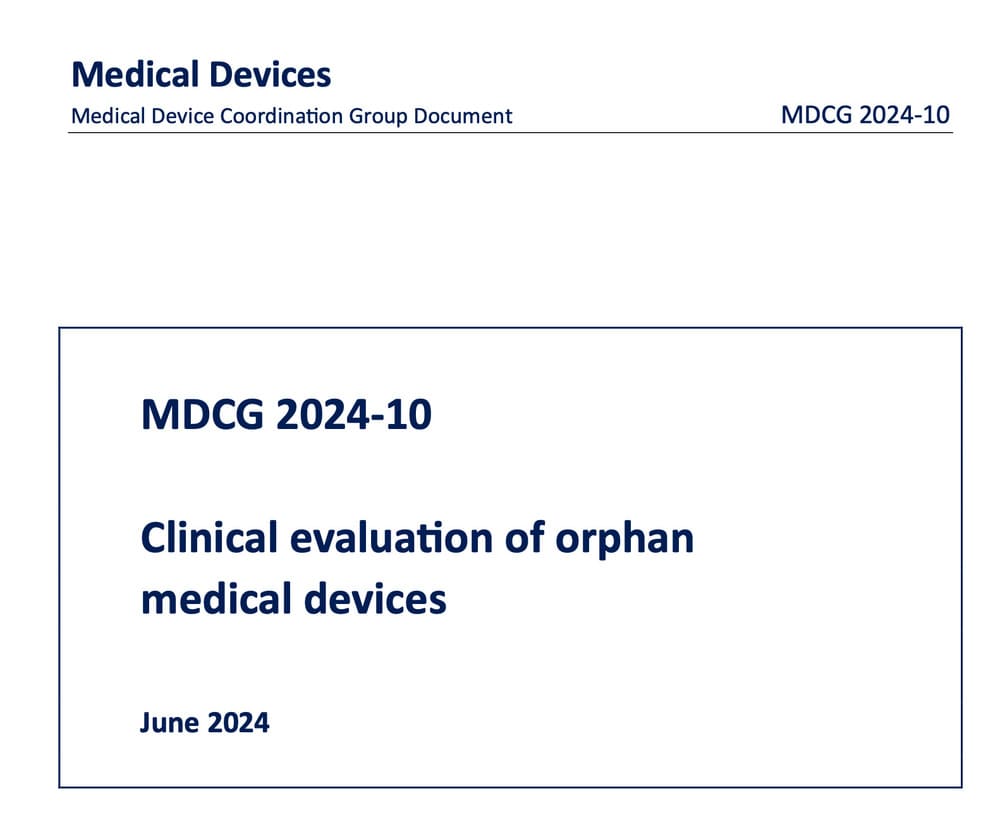
MDCG 2024-10 Clinical evaluation of orphan medical devices
Medical devices regulation
The document titled “Clinical evaluation of orphan medical devices” by the Medical Device Coordination Group (MDCG) provides comprehensive guidance on the clinical evaluation process for orphan medical devices under the EU Medical Device Regulation (MDR).
Introduction
The document, endorsed by the MDCG, addresses the unique challenges of evaluating orphan medical devices, which are intended for rare diseases affecting not more than 12,000 individuals annually in the EU. It offers specific guidance for manufacturers and notified bodies on clinical evaluation requirements, considering both new and legacy orphan devices.
Scope
The guidance applies to all risk classes of orphan devices and focuses on clinical evaluation and investigation requirements as outlined in MDR Chapter VI and Annex XIV. It excludes custom-made devices, in-house devices, products without an intended medical purpose (Annex XVI), and in vitro diagnostic medical devices.
Orphan Device Status and Criteria
To qualify as an orphan device, a device must:
- Be intended for a rare disease or condition affecting not more than 12,000 individuals per year in the EU.
- Offer a clinical benefit where alternative options are insufficient or expected to provide significant benefits over existing treatments.
Clinical Evaluation Considerations
Acceptability of Limitations in Pre-Market Clinical Data
Due to the rarity of conditions treated by orphan devices, there may be acceptable limitations in pre-market clinical data, provided these are transparently communicated and addressed through post-market clinical follow-up (PMCF).
Role of Non-Clinical Data
Non-clinical data, including laboratory, animal tests, and computer simulations, are crucial in supporting the safety and performance of orphan devices, especially when pre-market clinical data is limited.
Clinical Evaluation Overview
Manufacturers must:
- Establish and update a clinical evaluation plan.
- Identify, appraise, and analyze relevant clinical data.
- Generate additional clinical data if necessary.
- Document findings in a clinical evaluation report (CER).
- Continuously update the clinical evaluation through PMCF activities.
Procedural Considerations
Notified Body Activities
Notified bodies must ensure that orphan devices meet General Safety and Performance Requirements (GSPRs) and that limitations in clinical data are justified. Surveillance and post-certification monitoring are critical to maintain the validity of certifications.
Involvement of Expert Panels
Manufacturers can consult expert panels for early scientific advice on clinical development strategies. Expert panels can also provide advice on the orphan status of devices and required clinical data, especially when clinical evaluations are advanced or completed.
Appendices
The appendices provide detailed guidance on:
- Specific information to include in the CER for orphan devices.
- Considerations for clinical investigations, including study design and endpoints.
- Extrapolation of clinical data to support orphan indications.
This document emphasizes the need for a balanced and proportionate application of MDR requirements to ensure patient access to orphan devices without undue delay, highlighting the importance of transparency and thorough post-market surveillance.
We are at your service
European Regulation for Medical Devices MDR 2017/745 have added new requested requirements and these requirements form part of the documentation to be presented to the notified body (e.g. review of the in-depth clinical evaluation, PMS procedure, QC results from validation products, proof of staff skills, etc.). CSDmed brings its expertise and a methodical approach to its clients, start-ups, manufacturers, importers and distributors of medical devices, thanks to a team of specialized experts and consultants, who will be able to address the MDR dossiers in their entirety.
🔗 Contact us and find out how we can help you.